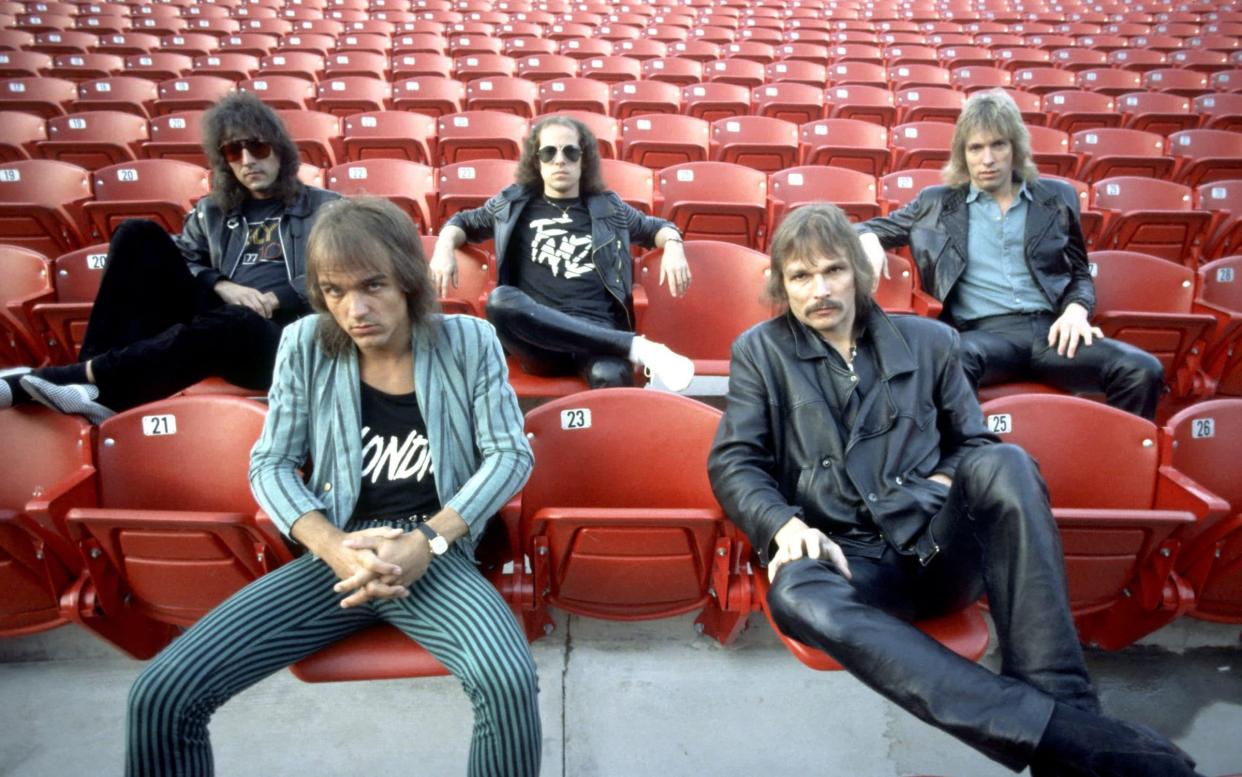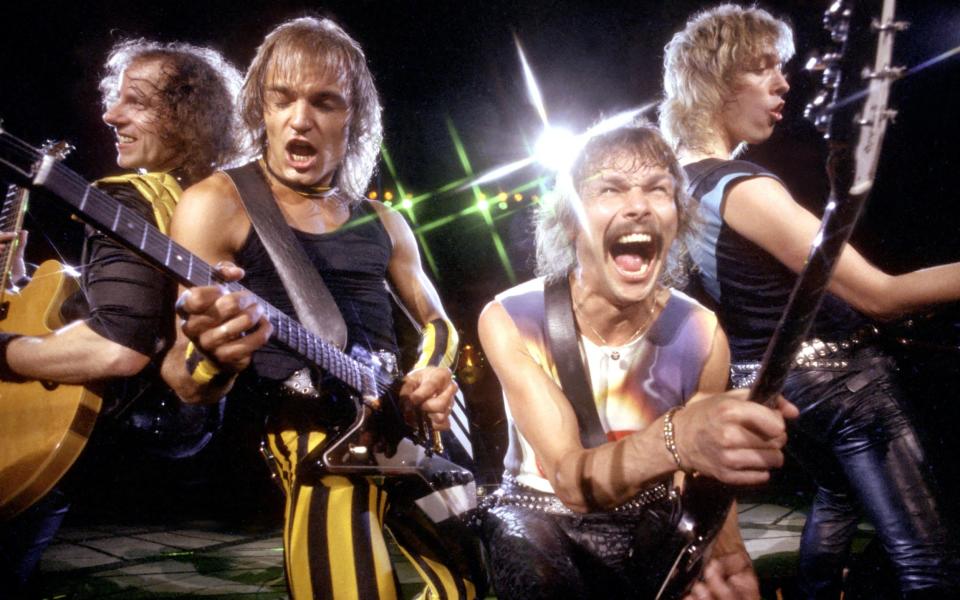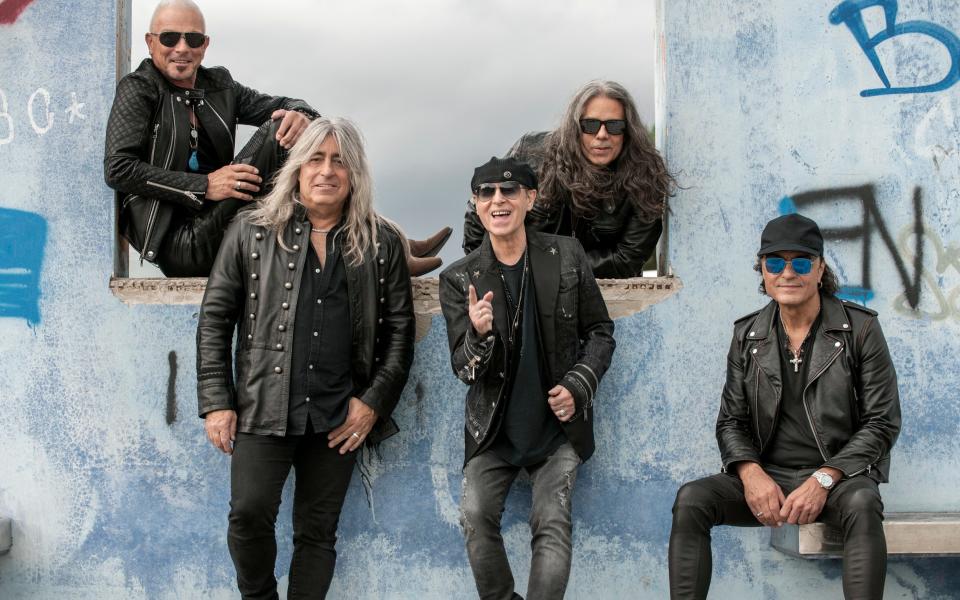Scorpions interview: ‘We wanted to break away from ugly German history’

On July 28 1979, Scorpions brought coals to Newcastle. Appearing at the World Series of Rock at the Cleveland Stadium, the Hanoverian group took their place at the bottom of a bill featuring Aerosmith, Ted Nugent, Journey, Thin Lizzy and AC/DC. The occasion is notable as being the first time a hard rock act from the non-English speaking world appeared before a vast audience in the United States. They had half an hour in which to make their point.
“We were still out there 45 minutes later,” recalls singer Klaus Meine. “Our manager was running on the stage, going nuts. ‘Get those crazy Germans off the stage! Can’t you make them stop?’ From there on, we went on the road as the opening band; AC/DC were the special guests and Ted Nugent was the headliner. We played for a month, big arenas all over America. We came back again as the special guests. Then we came back again [and] headlined Madison Square Garden.”
Forty-three years later, Scorpions are still rocking like a hurricane. Last week saw the release of Rock Believer, the quintet’s 19th album, and their first for seven years. Later this month the group will perform to more than 40,000 people over the course of a nine-night residency at Zappos Theater, in Las Vegas. Never mind that Meine and founding member Rudolph Schenker are now well into their seventies, the “Scorps” remain a machine of purring Teutonic efficiency.
Not that they look, or act, their age. On a blowy Thursday in the foothills of February, Klaus Meine appears on my computer screen looking every inch the dedicated hard-rocker. Dressed in black jeans, a black jumper, a black leather jacket, a black cap and sunglasses with lenses the size of car windscreens, he is both a forthcoming and, sometimes, a forthright interviewee. Despite a strident Lower Saxony accent, his English is good; certainly, it’s better than my German.
In the 20th century, music journalists might have done well to appreciate this point. As Scorpions rose to prominence, British and American writers seemed determined to overlook the colossal achievement of a continental heavy rock band attaining worldwide platinum status. Instead, they took the rise. The Melody Maker quoted Rudolph Schenker saying “how I speak with Ritcheee – Ritcheee Blackmore – an’ he say to me…”, while in the United States Creem reported on the guitarist’s admiration for “ze Prettay Zings… ze Prettay Zings!”

Needless to say, the group’s music has aged a good deal better than its press notices. Fans of Scorpions can be roughly divided into two camps: older listeners who prefer the neo-classical shading of early-day records such as Lonesome Crow and Fly To The Rainbow – released during the tenure of virtuosic lead guitarist Uli Jon Roth – or the arena-rocking monster-ballad era of albums such as Blackout and Love At First Sting. Owing more to the latter, Rock Survivor features the one constant that has long separated its authors from many other bands of their kind – a touch of class.
Of course, at this stage in their career there is very little need for Scorpions to bother with fresh material at all. “You do ask yourself, ‘Should we make a new album or should we just keep going?’” Meine admits. “We have such a huge back catalogue. Is there a need for a new one?” The band decided to proceed anyway after being advised by a “super-fan” in Athens that their supporters would welcome a box-fresh record, just so long as it rocked. Just so long as it had a bit of wallop behind it. “Of course,” says the singer, “the next question is then, ‘How?’ Is there a loss of confidence after all these years? It’s a huge question mark and a huge challenge to begin with.”
Truth be told, it was always thus. Never mind the critical plaudits that have rained down on fellow countrymen Kraftwerk and Can, the formation of Scorpions in 1965 proved to be a significant chapter in the healing process undertaken by Germany’s post-war generation. Turning their collar to traditional schlager music, as children its members tuned into Elvis and Little Richard on international radio. Early gigs saw them saw them playing western rock standards without having a clue what they were singing.
Klaus Meine believes that. “looking back”, the reason the band wrote their own songs in English “was because we tried to break away from the ugly German history”. Instead, “we tried to become part of the world community of musicians. We wanted to be a part of the international rock family. And by singing in English, even if the English was not quite good enough, [that] was the ticket to take our music all over the world and be a part of the world community.”
It worked, too. As a young teenager, I remember staring at a photograph of the band performing to 350,000 people, on the gatefold of the double concert LP World Wide Live, from 1985, and wondering where on earth such an event could possibly have been staged. The answer, I would later learn, was the Glen Helen Regional Park, in San Bernardino, California, at which Scorpions appeared below only headliners Van Halen on the “Heavy Metal Day” of the short-lived, and financially ruinous, US Festival.
“We thought, ‘Well how can we make this [show] special?” the singer recalls. “Other than playing a great gig, you know? So somebody hired fighter jets. Five fighter jets. When we came out onstage, these five fighter jets went flying across San Bernardino Valley, over the audience, and it was the most amazing intro a band can ever think of.”
You get the picture. By the time Scorpions hopped aboard a custom-painted 747 chartered by music mogul and convicted drug smuggler Harold “Doc” McGhee, en route to the Moscow Music Peace Festival, in 1989, they were as much a part of the western hard rock firmament as fellow passengers Ozzy Osbourne, Bon Jovi, Skid Row and Motley Crue. The only difference was that they lived in a city barely two hours from a wall in Berlin that had divided the northern hemisphere since 1961.
Describing the journey to the two concerts at the Central Lenin Stadium, Meine remembers that “many of [the bands] were drunk, or drugged up, or drugged out on the flight. Going to Moscow to play in the Soviet Union, the USSR… for us it was an emotional moment to play this show. For all of them, it was, like, just another gig, you know? Going east to go to Moscow, they couldn’t wait to get out of there, probably. For us, it was different.”
How could it not be? During the siege of Leningrad, Klaus Meine’s uncle had sat freezing inside a Panzer tank. Almost half a century later, Scorpions’ 10 concerts at the city’s SSK Arena, in 1988, saw them become the first genuine heavy rock band to appear behind the Iron Curtain. As is well known, a year later the group’s two performances in Moscow provided the blueprint for the give-peace-a-chance two-million-selling monster ballad Wind Of Change, from 1990, by far their biggest hit.
Such was the single’s omnipotence, in fact, that 30 years later a seven-hour podcast of the same name lent wholly undeserved credence to the conspiracy theory that it had in fact been written by the CIA. Today, this shaggy-dog story merits mention only because of a quite beautiful moment in which its narrator, the Orwell Prize-winning journalist Patrick Radden Keefe, is moved to high-pitched excitement upon hearing the band perform the song at a concert at the Palats Sportu, in Kyiv. The events of the past week have only added to its poignancy.
The more I think about it, though – and this I’ve done with greater regularity than you might imagine – the more I’ve come to regard the series as an act of grievous disrespect. Come the final episode, when Radden Keefe at last asks Klaus Meine whether or not his most famous song is the doing of a foreign government, the singer’s response is nothing less than pure bewilderment. If he’s a phoney, he ought to have been an actor rather than a rock star.
“I could have stormed out of the room going, ‘You crazy motherf---er!’” Meine tells me. “What did he think? That I’ve been lying for all these years? I realised what he was up to and I just tried to be cool with it. The thing is, in times when conspiracy theories about the pandemic go so crazy, there are just a lot of people who believe, or who want to believe, that this could be true. ‘This German guy can write a song like this? No way!’ So it must have been the CIA, of course.”

In the end, though – or at least what looked like the end – even the blockbusting success of Wind Of Change couldn’t protect its authors from the music industry’s own transformative hurricane. Scorpions may have seen off the challenge of punk handily enough, but by 1993 the exponential rise of alternative music had rendered them vulnerable. Certainly their new record company, Polygram, thought so. On a visit to the label’s New York headquarters, its executives failed even to recognise the group.
“We were a band who had multi-platinum record sales in the United States, but they had no idea,” Meine recalls. “We were the s--t of yesterday. We were done… It was devastating. It was absolutely devastating. Nobody knew if this would be the end of the Scorpions.”
As if. Instead, the group decided to bide their time. “You had to be patient enough to wait for the moment when the music world goes full circle,” I’m told. “We worked our way through… We were fighting our way back. The quality of a band shows not only when you go through the good times, but also when you’re back on the ground. So we just said, ‘Okay, well we’ll go again.’ And now here we are, we’re all the way back.”
The only difference being that this time Scorpions have company. Rammstein, the state of the art button-pushing metal sextet from the east side of Berlin, had risen to stadium-packing status by setting themselves on fire, dressing their stages to look like totalitarian rallies, appearing in music videos dressed as Holocaust victims, and addressing directly the ghosts of their nation’s past. Forget about not mentioning the war, singing in German, this lot never shut up about it.
“I didn’t like them for a long time,” Meine admits. “With [singer] Till [Lindemann] and his harsh German accent, you know, it brings back a time in history when it’s the darkest moment for Germany. But then Rudolph [Schenker] said to me, ‘Rammstein are playing, you’ve got come with me, you’ve got to see this.’ And so I did. We watched the show and I was blown away. I was totally blown away.”
But, really, Klaus Meine and Rudolph Schenker were watching their own children. For while it’s hard to imagine two bands with such differing approaches to the delivery of loud music – it is, in fact, easier to picture Scorpions playing a song by The Fall than writing one about the fall of Hanover – it’s equally difficult to imagine a pairing with a clearer, and stronger, lineage. The reason their country is now big enough for the both of them is because of the work put in over many decades by the elder group.
“I think we opened many doors,” says Meine. “Being a German band, we taught the world that Germany [doesn’t] only come with tanks. We can come with music and rock’n’roll, too. We can bring love and peace.”
Rock Survivors by Scorpions is out now on Vertigo Berlin
